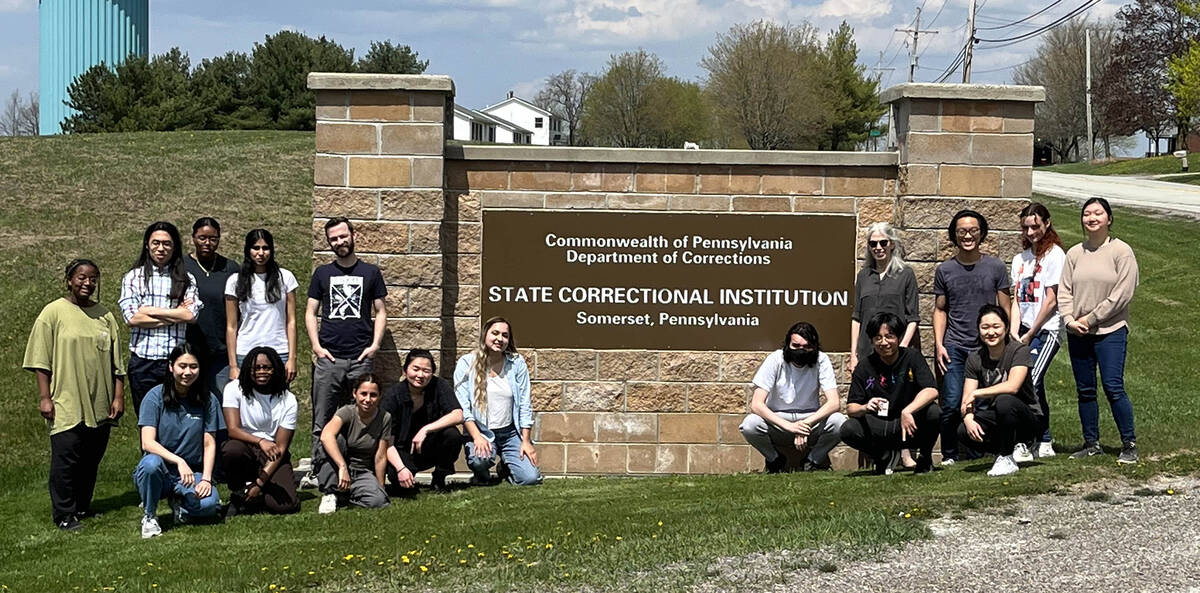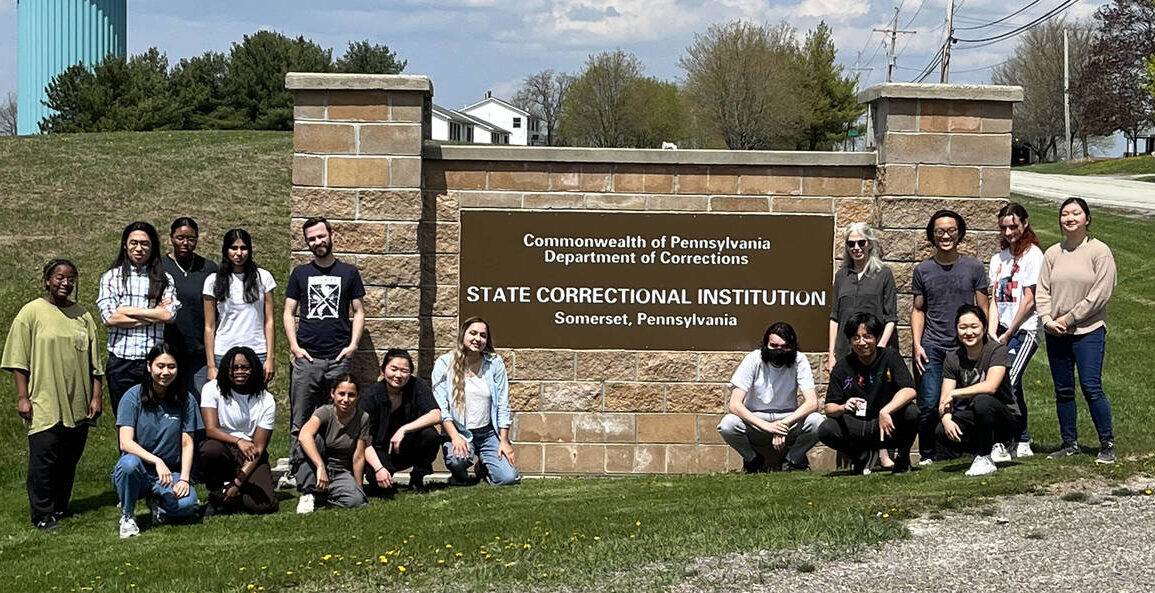Every Friday during the spring 2023 semester, 15 students from Carnegie Mellon University piled into a van to make the 70-mile trip to the State Correctional Institute (SCI) at Somerset, a Pennsylvania state penitentiary. Accompanied by Wendy Goldman(opens in new window), the Paul Mellon Distinguished Professor of History, and Kody Manke-Miller(opens in new window), an assistant teaching professor in the Psychology Department, these students took the first courses offered through the CMU Prison Education Project (CMU PEP)(opens in new window).
Modeled after the nationwide prison education program Inside-Out(opens in new window), CMU PEP courses are taught once a week inside a local prison and are made up of half non-incarcerated (“outside”) students and half incarcerated (“inside”) students. Rather than teach or tutor, CMU students are there to learn alongside the students who are incarcerated. Carnegie Mellon students register through normal channels and fill out a short questionnaire, which the professors use to determine eligibility. Once registered, both inside and outside students follow a regular CMU curriculum and receive full credit for their coursework.
This past spring, the program offered two courses: “Psychology and Society” taught by Manke-Miller and “Russian History: Game of Thrones” taught by Goldman. This fall, Jeffrey Williams(opens in new window), professor of English and Literary and Cultural Studies, is teaching “Major Fiction Then and Now: Imagining the World.” Students registering for spring 2024 can take “Creative Writing in Community” with Jane McCafferty(opens in new window), professor of English and director of the Creative Writing Program, or “Germany and the Second World War” taught by Donna Harsch(opens in new window), professor of history.
“It really helps you with breaking down stereotypes you may have not even known you had.” — Vaun Moser
The program is the result of years of effort and careful planning on Goldman’s part. In the summer of 2020, the murder of George Floyd ignited a wave of activism and pushed Goldman to do something she’d been considering for a long time: start a prison education program. With support from Richard Scheines, Bess Family Dean of the Dietrich College of Humanities and Social Sciences(opens in new window), and Nico Slate, head of the History Department, Goldman reached out to Dietrich College faculty to gauge interest. Manke-Miller was one of many intrigued by the concept. As a social psychologist who studies inter-group interactions, he hoped PEP would help CMU students break down their understanding of difference.
“When we don’t have interactions with other people, when we are going off stereotypes or just assumptions, we are really bad at understanding the world,” said Manke-Miller, whose reasons for joining CMU PEP were also personal. “I have many family members who have been incarcerated. I know [prisons] systemically deny people opportunities.”
A team of committed faculty was a good start, but Goldman also had to find a prison willing to partner with the university. At the height of the pandemic, with prisons in lockdown and closed even to family members, this was an especially difficult feat. Eventually, she was able to establish an agreement with SCI Somerset.
Before entering the prison, CMU students and professors must follow a rigid set of security steps. First, they lock their cell phones, laptops and coats in the van. They go through metal detectors, are patted down and have their hands dusted for drug residue. Once cleared, they pass through a series of gates and walk across an open-air prison yard. Goldman and Manke-Miller are unable to bring in paper; reading materials must be scanned, emailed to the prison and printed inside the facility. When Goldman asked if she could teach her students a traditional Russian dance, she was informed it would be impossible: the dance involved participants holding hands, and the inside and outside students were forbidden from touching.
Why go to these lengths just to teach or take a class? For Joseph Chan, a sophomore in the School of Computer Science, PEP felt like a unique opportunity that might not have been available to him under other circumstances.
“I’m an international student,” Chan said. “I came to the U.S. wanting to seek out some new experiences. When I first heard about the course I was like, yeah, I definitely need to go for this. It’s something I wouldn’t be able to do back in my home country.”
“I’ve been in higher education for 35 years, and I’ve never seen anything like it.” — Richard Scheines
Camille Chandler, a junior in the Psychology and Social and Decision Sciences departments, said when she first heard about PEP, she was skeptical. Researching the mission and structure of the program was encouraging, but she wasn’t fully convinced until she attended an in-person information session.
“All the students and professors were very excited about the program and very willing to try something this unique and different,” Chandler said. “I thought with a group of people who wanted to do this as badly as everyone did, and me wanting to do it but just being a little bit nervous, it made no sense for me not to give it a shot.”
Chandler’s nerves were dispelled on the first day of class, when she and an inside student discovered that they both love the singer Lauryn Hill. For her, this connection helped break down an invisible barrier.
“We really don’t communicate across lines of difference,” Chandler said. “Programs like PEP help us root our ideas of difference in real, lived experience.”
Vaun Moser, a sophomore in the Carnegie Mellon Institute for Strategy and Technology (CMIST) and the History Department, agreed.
“It really helps you with breaking down stereotypes you may have not even known that you had,” she said.
Moser added that her classroom experience in SCI Somerset was uniquely supportive.
“One of the first days, when we were all in a circle having a discussion about the reading, I shared my opinion on something and one of the inside students next to me was like, ‘Oh, I really like that. Good job!’ And ever since then, we’ve all just started encouraging each other after sharing our opinion,” she said.

PEP is also an exciting opportunity for the inside students. When the courses were first announced, nearly 400 people applied to take them.
“For the incarcerated students, I think it’s a chance to access education in a way that is often denied to lots of parts of society,” Manke-Miller said. “And not just access but the experience of being able to interact with [the course material] and think, ‘Oh, I have complicated thoughts about the world as well, and they’re represented in some of the things I’m reading about.’”
This excitement is reflected in the quality of the inside students’ work.
“The class has been one of the most interesting classes I have ever taught in over 30 years,” Goldman said. “The inside students engage with the material in a way that is an absolute joy to a professor.”
Goldman pointed out many of the inside students went to prison in their late teens or early twenties — the same age the CMU students are now — and have been incarcerated for upwards of two decades. For these students, the opportunity to take college courses is especially meaningful.
Brandon, an SCI Somerset student, said of PEP, “I cannot begin to express how much it was appreciated. I always looked forward to Fridays, not because I was getting off the housing unit or going to school, but mainly because the professor and the CMU students treated me and the other inmates like real people.”
As the spring 2023 term drew to a close, Goldman and Manke-Miller felt it was important to acknowledge the students’ hard work and dedication. On the last day of class, the inside and outside students received certificates at a special ceremony attended by Dietrich College’s dean.
“The experience of watching equal numbers of CMU students and Somerset Prison students get certificates was deeply gratifying,” Scheines said. “Students were transformed and said so. I’ve been in higher education for 35 years, and I’ve never seen anything like it.”
Jacob, an SCI Somerset student, wrote in his course evaluation, “I have thoroughly enjoyed the entire experience of the program. It offered an enclave of humanity and higher education within an environment that is often bereft of both.”
This post was originally published on this site be sure to check out more of their content.







